人教版新目标九年级英语Unit12知识点及练习(无答案)(最新整理)
新目标九年级英语unit12知识点汇总
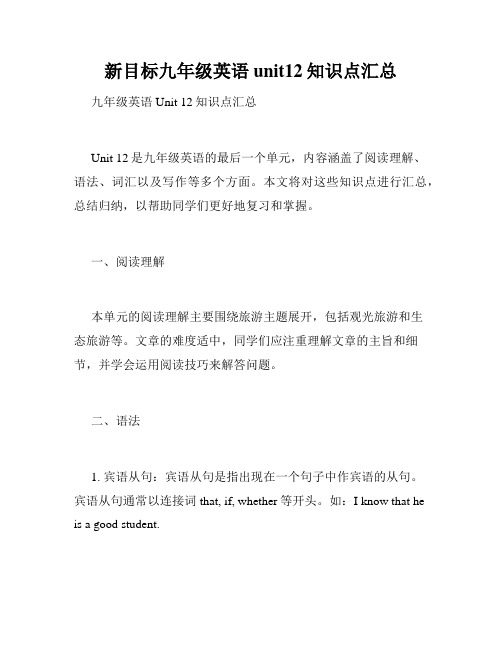
新目标九年级英语unit12知识点汇总九年级英语Unit 12知识点汇总Unit 12是九年级英语的最后一个单元,内容涵盖了阅读理解、语法、词汇以及写作等多个方面。
本文将对这些知识点进行汇总,总结归纳,以帮助同学们更好地复习和掌握。
一、阅读理解本单元的阅读理解主要围绕旅游主题展开,包括观光旅游和生态旅游等。
文章的难度适中,同学们应注重理解文章的主旨和细节,并学会运用阅读技巧来解答问题。
二、语法1. 宾语从句:宾语从句是指出现在一个句子中作宾语的从句。
宾语从句通常以连接词that, if, whether等开头。
如:I know that he is a good student.2. 将来进行时:将来进行时表示将来某个时间正在进行的动作或某个未来的事件。
构成:will be + 动词ing。
如:They will be watching a movie at this time tomorrow.3. 动词不定式的被动语态:动词不定式的被动语态由to be + 过去分词构成。
如:The problem needs to be solved.4. 特殊疑问句:特殊疑问句用来询问某个具体的信息,常见的特殊疑问词有:what, who, when, where, why, how等。
如:What time is it?三、词汇1. 旅游相关词汇:tourist, travel, destination, attraction, guide, sightseeing等。
2. 计量词:本单元涉及了一些计量词,如:a pair of, a group of,a piece of等。
在使用时要注意与名词的搭配。
3. 形容词和副词:学习一些形容词和副词可以丰富语言表达,如:breathtaking, fascinating, slightly等。
四、写作本单元的写作任务是写一篇关于英国旅游的文章。
写作时可以运用所学的词汇和语法知识,通过添加细节和论述观点来丰富文章。
【最新】【人教版】九年级新目标英语:Unit 12 知识点总结
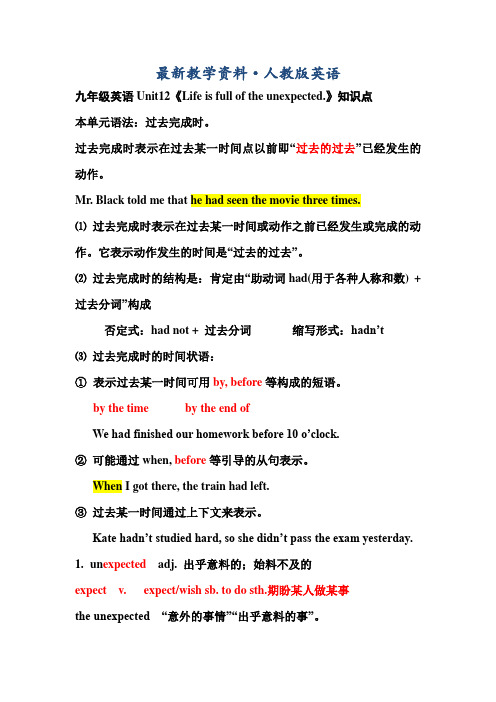
最新教学资料·人教版英语九年级英语Unit12《Life is full of the unexpected.》知识点本单元语法:过去完成时。
过去完成时表示在过去某一时间点以前即“过去的过去”已经发生的动作。
Mr. Black told me that he had seen the movie three times.⑴过去完成时表示在过去某一时间或动作之前已经发生或完成的动作。
它表示动作发生的时间是“过去的过去”。
⑵过去完成时的结构是:肯定由“助动词had(用于各种人称和数) + 过去分词”构成否定式:had not + 过去分词缩写形式:hadn’t⑶过去完成时的时间状语:①表示过去某一时间可用by, before等构成的短语。
by the time by the end ofWe had finished our homework before 10 o’clock.②可能通过when, before等引导的从句表示。
When I got there, the train had left.③过去某一时间通过上下文来表示。
Kate hadn’t studied hard, so she didn’t pass the exam yesterday.1.un expected adj. 出乎意料的;始料不及的expect v. expect/wish sb. to do sth.期盼某人做某事the unexpected “意外的事情”“出乎意料的事”。
the +adj.表示一类人或事物。
the homeless (无家可归者) the disabled(残疾人)the wounded(战争中受伤的人) the injured(事故中受伤的人)2.by the time+时间状语从句(1)时间状语从句的时态是一般现在时时(表示将来),主句用将来完成时;(2)时间状语从句是一般过去式时,主句用过去完成时。
人教版九年级英语Unit12单元知识点梳理
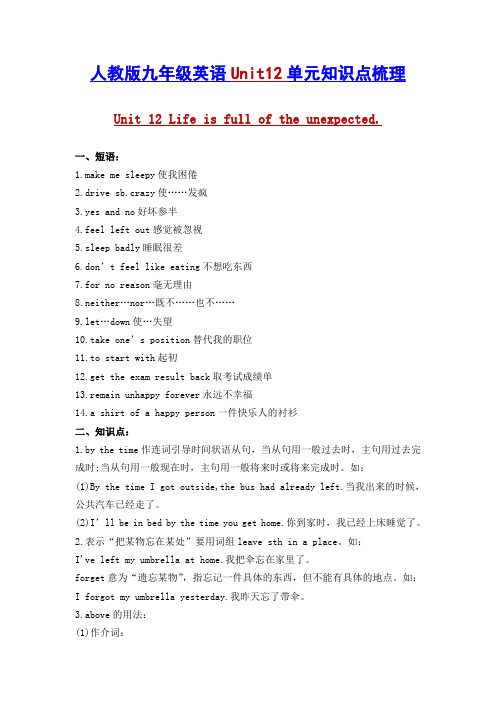
一、短语:1.make me sleepy使我困倦2.drive sb.crazy使……发疯3.yes and no好坏参半4.feel left out感觉被忽视5.sleep badly睡眠很差6.don’t feel like eating不想吃东西7.for no reason毫无理由8.neither…nor…既不……也不……9.let…down使…失望10.take one’s position替代我的职位11.to start with起初12.get the exam result back取考试成绩单13.remain unhappy forever永远不幸福14.a shirt of a happy person一件快乐人的衬衫二、知识点:1.by the time作连词引导时间状语从句,当从句用一般过去时,主句用过去完成时;当从句用一般现在时,主句用一般将来时或将来完成时。
如:(1)By the time I got outside,the bus had already left.当我出来的时候,公共汽车已经走了。
(2)I’ll be in bed by the time you get home.你到家时,我已经上床睡觉了。
2.表示“把某物忘在某处”要用词组leave sth in a place。
如:I've left my umbrella at home.我把伞忘在家里了。
forget意为“遗忘某物”,指忘记一件具体的东西,但不能有具体的地点。
如:I forgot my umbrella yesterday.我昨天忘了带伞。
3.above的用法:(1)作介词:在……上面,如:The moon is above the trees now.月亮现在正位于树梢上。
‚在…之上,超过,如:They are children above six years old.他们是六岁以上的孩子。
最新人教版九年级英语第12单元重要知识点总结大全

最新人教版九年级英语第12单元重要知识点总结大全1. 单词和短语- 否定副词:never, hardly, seldom, rarely- 名词短语:a bunch of, a series of, a variety of, a source of- 形容词短语:fed up with, worried about, interested in, tired of2. 语法2.1 过去完成时- 表示在过去某一时间或事件之前已经完成的动作或状态。
- 构成:had + 过去分词。
2.2 宾语从句- 宾语从句用来充当动词或介词的宾语,说明它所作的动作或动作的对象。
- 引导宾语从句的连词:that, whether, if, when, where, why, how 等。
2.3 名词性从句- 名词性从句可以充当主语、宾语、表语或同位语。
- 引导名词性从句的连词:that, whether, if, what, who, whom, which, whose, when, where, why, how等。
2.4 定语从句- 定语从句用来修饰一个名词或代词,并且不能独立存在。
- 引导定语从句的关系代词:that, which, who, whom, whose。
3. 文化知识- 英国文化:英国人最喜欢的体育运动是足球,也称为英式足球。
英国还有伦敦塔、巨石阵等许多著名的文化和历史遗迹。
- 美国文化:美国四个最受欢迎的体育运动是足球、篮球、棒球和冰球。
美国有百老汇和好莱坞等著名的文化产业。
4. 阅读技巧- 阅读理解题:先通读全文,找出文章主旨,然后仔细阅读每一段,根据段落大意进行答题。
- 完型填空题:通读全文,理解上下文的意思,根据句子结构和语法规律进行填空。
- 词汇题:通过上下文的句子理解和推断词义,选择正确的词汇填空。
以上是最新人教版九年级英语第12单元的重要知识点总结。
希望对你有帮助!。
人教版初中英语9年级全一册Unit12 知识清单 +习题 (包含答案)

人教版初中英语9年级全一册Unit12 知识清单+习题(包含答案)九年Unit 12 Life is full of the unexpected 一、必背词汇unexpected adj.出乎意料的;始料不及的backpack n.背包;旅行包oversleep v.睡过头;睡得太久block n.街区worker n.工作者;工人stare v.叮着看;凝视disbelief n.不信;怀疑above prep.在…上面adv在上面burn v.着火;燃烧burning adj.着火的;燃烧的alive adj.活着;有生气的airport n.机场till prep.&conj,到;直到west adv.向西;朝西adj.向西的;西部的n.西;西方cream n.奶油;乳脂workday n.工作日pie n.果馅饼;果馅派bean n.豆;豆荚market n.市场;集市fool n.蠢人;傻瓜v愚弄costume n,服装;装束embarrassed adj.窘迫的;害羞的announce v.宣布;宣告spaghetti n.意大利面条hoax n骗局;恶作剧discovery n.发现;发觉lady n.女士;女子cancel v.取消;终止officer n.军官;官员believable adj.可相信的;可信任的disappear v.消失;不见embarrassing adj.使人害羞的二、常考短语、用法by the time在…以前give…… a lift捎…一程in line with与…成一排show up赶到;露面by the end of在(某时间点)以前costume party化装舞会sell out卖光take a shower洗淋浴be late for.做……迟到go off(闹铃、警铃等)响起wake up醒来put on穿上rush out冲出;奔出brush one’s teeth刷牙end up最终成为,最后处于be full of充满;装满stare at 凝视……;盯着……看in disbelief怀疑地;难以置信地take off起飞turn into变成arrive at到达leave for动身去…get dressed穿衣服stay up熬夜on April Fool’s Day在愚人节那天all kinds of各种各样的play jokes on sb.开某人的玩笑no more不再get married结婚hundreds of数以百计的the whole country全国run away逃跑hear about 听说invite sb. to+某地邀请某人去某地leave+宾语+地点状语把…忘在某处start doing sth. 开始做某事be about to do sth.刚要/即将做某事decide to do sth.决定做某事forget to do sth.忘记做某事keep doing sth.继续做某事ask sb.to do sth.请求某人做某事marry sb.=get married to sb.和某人结婚as much+不可数名词+as one can/could尽可能多so+adi./adv+that.如此…以至于…(that引导结果状语从句)finish doing sth.完成某事get a chance to do sth.得到机会做某事三、重点句型1. By the time I got up, my brother had already gotten in the shower.我起床时,我的哥哥已经在洗淋浴了。
人教版新目标初三英语Unit 12 知识点总结

人教版新目标初三英语Unit 12 知识点总结In Unit 12 of 9th grade English。
the focus is on the past perfect tense。
This tense is used to describe an n that had already happened before a certain point in the past。
For example。
"Mr。
Black told me that he had seen the movie three times."The structure of the past perfect tense is "had + past participle." It can be used in the negative form by adding "not"after "had," or by using the n "hadn't."There are several time ns that can be used with the past perfect tense。
"By" and "before" can be used to indicate a specific time in the past。
For example。
"We had finished our homework before 10 o'clock." "When" and "before" can be used to XXX。
For example。
"When I got there。
the train had left." Finally。
unit12知识点精讲精练2022-2023学年英语九年级全一册(人教新目标版)
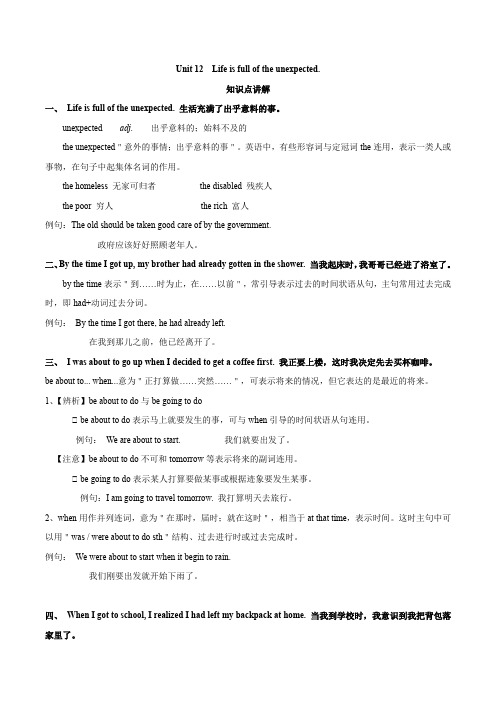
Unit 12 Life is full of the unexpected.知识点讲解一、Life is full of the unexpected. 生活充满了出乎意料的事。
unexpected adj.出乎意料的;始料不及的the unexpected"意外的事情;出乎意料的事"。
英语中,有些形容词与定冠词the连用,表示一类人或事物,在句子中起集体名词的作用。
the homeless 无家可归者the disabled 残疾人the poor 穷人the rich 富人例句:The old should be taken good care of by the government.政府应该好好照顾老年人。
二、By the time I got up, my brother had already gotten in the shower. 当我起床时,我哥哥已经进了浴室了。
by the time表示"到……时为止,在……以前",常引导表示过去的时间状语从句,主句常用过去完成时,即had+动词过去分词。
例句:By the time I got there, he had already left.在我到那儿之前,他已经离开了。
三、I was about to go up when I decided to get a coffee first. 我正要上楼,这时我决定先去买杯咖啡。
be about to... when...意为"正打算做……突然……",可表示将来的情况,但它表达的是最近的将来。
1、【辨析】be about to do与be going to do① be about to do表示马上就要发生的事,可与when引导的时间状语从句连用。
例句:We are about to start. 我们就要出发了。
【注意】be about to do不可和tomorrow等表示将来的副词连用。
人教版英语九年级全册单元unit 12 知识点+测试卷+思维导图
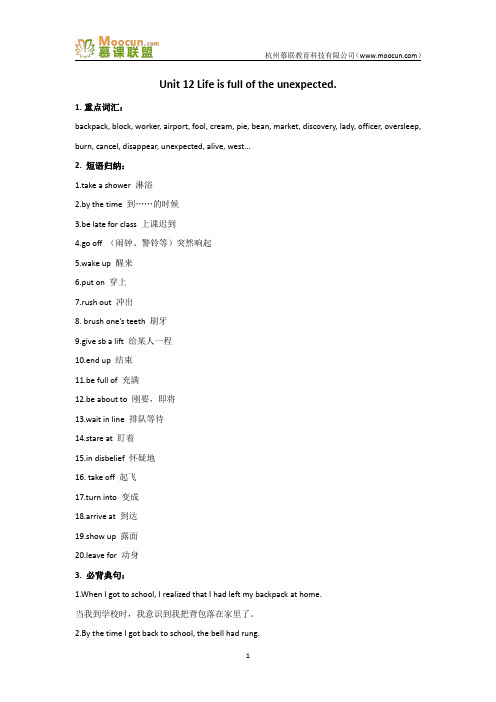
Unit 12 Life is full of the unexpected.1.重点词汇:backpack, block, worker, airport, fool, cream, pie, bean, market, discovery, lady, officer, oversleep, burn, cancel, disappear, unexpected, alive, west...2. 短语归纳:1.take a shower 淋浴2.by the time 到……的时候3.be late for class 上课迟到4.go off (闹钟、警铃等)突然响起5.wake up 醒来6.put on 穿上7.rush out 冲出8. brush one’s teeth 刷牙9.give sb a lift 给某人一程10.end up 结束11.be full of 充满12.be about to 刚要,即将13.wait in line 排队等待14.stare at 盯着15.in disbelief 怀疑地16. take off 起飞17.turn into 变成18.arrive at 到达19.show up 露面20.leave for 动身3. 必背典句:1.When I got to school, I realized that I had left my backpack at home.当我到学校时,我意识到我把背包落在家里了。
2.By the time I got back to school, the bell had rung.当我回到学校时,铃声已经响了。
3. Before I got to the bus stop, the bus had already left.在我到达公共汽车站之前,公共汽车已经开走了。
4. As I was waiting in the line with the other office workers, I heard a loud sound.当我和其他办公室工作人员在排队的时候,我听到了一个很大的声音。
人教新目标英语九年级全册 Unit 12 Life is full of the unexpected 知识点汇编

【聚焦中考】:Unit12 必考知识点汇编1. By the time I got up, my brother had already gotten in the shower.到我起床的时候,我哥哥已经在洗澡了。
(教材第89页)➢中考链接考查动词时态的用法(黔东南) The bus ______ for five minutes when Tim arived at the station.A. wentB. has leftC. had leftD. had been away【答案】D【解析】when引导的时间状语从句为一般过去时,主句动作leave发生在从句动作arrived之前,即leave发生在过去的过去,需用过去完成时;与时间段连用时,leave要转化为可延续的形式be away。
(襄阳中考) 一We all went to the cinema except you last night. Why didn’t you come?—Because I _______ that movie twice.A. have watchedB. had watchedC. was watchingD. would watch【答案】B【解析】考查动词时态的用法。
根据交际情景可知,我昨晚不去看电影,是因为我以前看过了。
叙述的是“过去的过去”发生的事,用过去完成时,故选B。
2. When I got home, I realized I had left my keys in the backpack.第1页/共7页当我到家时,我意识到我把我的钥匙落在背包里了。
(教材第90页)➢中考链接考查动词leave, forget辨析(滨州)—I’m sorry I ______my exercise book at home this morning.—It doesn’t matter.Don’t forget ______ it here this afternoon.A. left; to takeB. forgot; bringingC. left; to bringD. forgot; to bring【答案】C【解析】leave sth. somewhere是固定搭配,意为“把某物遗忘在某处”,排除选项B和D;take是带走,bring是带来,don’t forget to bring…意为“别忘把……带来”。
Unit12重点知识人教版九年级英语全册
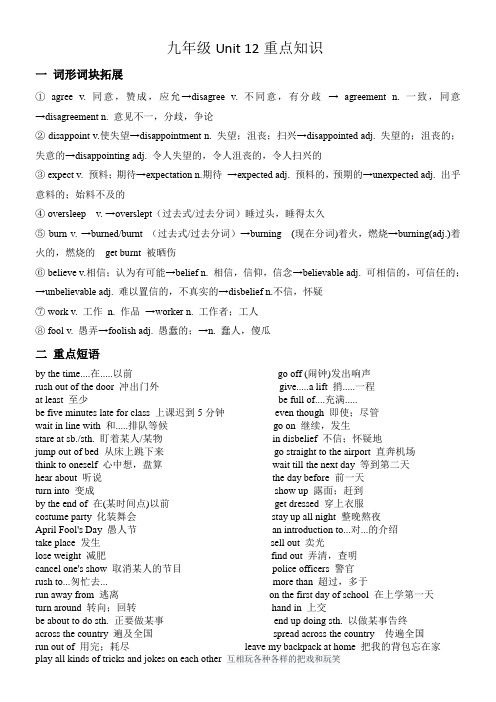
九年级Unit 12重点知识一词形词块拓展①agree v. 同意,赞成,应允→disagree v. 不同意,有分歧→ agreement n. 一致,同意→disagreement n. 意见不一,分歧,争论② disappoint v.使失望→disappointment n. 失望;沮丧;扫兴→disappointed adj. 失望的;沮丧的;失意的→disappointing adj. 令人失望的,令人沮丧的,令人扫兴的③ expect v. 预料;期待→expectation n.期待→expected adj. 预料的,预期的→unexpected adj. 出乎意料的;始料不及的④ oversleep v. →overslept(过去式/过去分词)睡过头,睡得太久⑤ burn v. →burned/burnt (过去式/过去分词)→burning (现在分词)着火,燃烧→burning(adj.)着火的,燃烧的get burnt 被晒伤⑥ believe v.相信;认为有可能→belief n. 相信,信仰,信念→believable adj. 可相信的,可信任的;→unbelievable adj. 难以置信的,不真实的→disbelief n.不信,怀疑⑦ work v. 工作n. 作品→worker n. 工作者;工人⑧ fool v. 愚弄→foolish adj. 愚蠢的;→n. 蠢人,傻瓜二重点短语by the time....在.....以前go off (闹钟)发出响声rush out of the door 冲出门外give.....a lift 捎.....一程at least 至少be full of....充满.....be five minutes late for class 上课迟到5分钟even though 即使;尽管wait in line with 和.....排队等候go on 继续,发生stare at sb./sth. 盯着某人/某物in disbelief 不信;怀疑地jump out of bed 从床上跳下来go straight to the airport 直奔机场think to oneself 心中想,盘算wait till the next day 等到第二天hear about 听说the day before 前一天turn into 变成show up 露面;赶到by the end of 在(某时间点)以前get dressed 穿上衣服costume party 化装舞会stay up all night 整晚熬夜April Fool's Day 愚人节an introduction to...对...的介绍take place 发生sell out 卖光lose weight 减肥find out 弄清,查明cancel one's show 取消某人的节目police officers 警官rush to...匆忙去... more than 超过,多于run away from 逃离on the first day of school 在上学第一天turn around 转向;回转hand in 上交be about to do sth. 正要做某事end up doing sth. 以做某事告终across the country 遍及全国spread across the country 传遍全国run out of 用完;耗尽leave my backpack at home 把我的背包忘在家play all kinds of tricks and jokes on each other 互相玩各种各样的把戏和玩笑三.Grammar过去完成时1.When I got to school, I realized I had left my backpack at home.2.By the time I got back to school, the bell had rung.3.But before I got to the bus stop, the bus had already left.Summary:1)意义:过去完成时表示过去某个时间或某个动作____发生的动作,它表示动作发生的时间是“________________”,它是一种相对于___________的时态,没有_________________就没有过去完成时态。
人教版九年级英语第十二单元Unit12知识点+习题
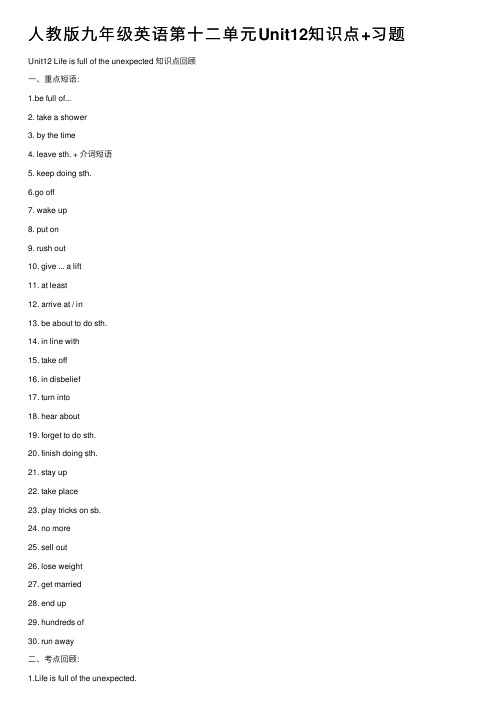
⼈教版九年级英语第⼗⼆单元Unit12知识点+习题Unit12 Life is full of the unexpected 知识点回顾⼀、重点短语:1.be full of...2. take a shower3. by the time4. leave sth. + 介词短语5. keep doing sth.6.go off7. wake up8. put on9. rush out10. give ... a lift11. at least12. arrive at / in13. be about to do sth.14. in line with15. take off16. in disbelief17. turn into18. hear about19. forget to do sth.20. finish doing sth.21. stay up22. take place23. play tricks on sb.24. no more25. sell out26. lose weight27. get married28. end up29. hundreds of30. run away⼆、考点回顾:1.Life is full of the unexpected.【解析1】be full of = be filled with充满,装满①Our life is ______________chances, but there are also a lot of challenges.(充满)②The box is_______________(装满) books.③On hearing the news, her heart was _____ gratitude.A.filled ofB. full withC. filled withD. fill with【2014辽宁丹东】—Look! Here comes Cindy! She is always full of .—So she is. because she takes a lot of exercise every day.A. knowledgeB. courageC. changeD. energy【解析2】unexpected adj. 出乎意料的;始料不及的the unexpected “意外的事情”“出乎意料的事”。
最新人教版新目标英语九年级-Unit12单元知识点小结

Unit12. Life is full of the unexpected重点短语句子重难点解析 1. Life is full of the unexpected. 生活充满了意外。
be full of (= be filled with ) 充满,装满①Our life ____________________(充满)chances, but there are also a lot of challenges.②The box ____________________(装满)books.③On hearing the news, her heart was _____ gratitude (感激).A. filled ofB. full withC. filled withD. fill with2. By the time I got outside, the bus had already left. 当我到外面的时候,公共汽车已经离开了。
by the time 在……以前 (常引导表示过去的时间状语从句,主句常用过去完成时。
) By the time I got up, he had already left. 我起床时,他已经走了。
① I overslept this morning. By the time I got to the train station, the train ____________(leave ). ②By the time of last term, we ______ all the lessons.A. finishedB. have finishedC. had finishedD. will finish③____ the time I heard the noise, it had already gone. A. By B. When C. At【拓展】by now 表示“到现在为止”,通常与现在完成时连用。
人教版新目标九年级英语Unit 12 知识点及练习(无答案)

Unit12 Life is full of the unexpected.知识点及练习Section A1.Life is full of the unexpected. 生活充满了意外。
be full of = be filled with充满,装满unexpected adj. 出乎意料的;始料不及的the unexpected “意外的事情”“出乎意料的事”。
the +adj.表示一类人或事物。
英语中,有些形容词与定冠词the连用,表示一类人或事物,在句子中起名词的作用。
the homeless 无家可归者the disabled 残疾人expect v.期望,预期expect to do sth.期望做某事expect sb. to do sth.期望某人做某事2.by the time 在……以前,指从过去的某一点到从句所示的时间为止,常引导表示过去的时间状语从句,主句常用过去完成时,即had+动词过去分词。
3. leave 与forget的用法:1) leave “ 遗留,落下,忘记带”,侧重指把某物或某人留在某个地方,后常跟地点状语;英语中表示“把某物遗忘在某处”常用leave +地点。
(1)leave sth. +地点把某物遗忘在某地(2)leave for +地点离开去某地(3) leave a message 留言ask for leave 请假leave school (中学) 毕业(4)leave one by oneself=leave sb. alone 把某人单独留下2)forget “ 忘记”,侧重指忘记某件事情,后常跟to do (忘了要去做)或doing (忘了做过)。
forget→forgot→forgotten v忘记(1) forget sth 忘记某事(不能跟地点状语连用)He forgot his grandfather’s name.(2) forget to do sth 忘记去做某事(未做)(3) forget doing sth 忘记做过某事(已做)4. give sb. a lift =give sb. a ride / give a ride to sb. 捎某人一程5. be about to 即将做某事;正要做某事侧重于表示动作马上就要发生,常与when引导的从句连用,但不与具体的时间状语连用。
(word完整版)人教版新目标九年级英语Unit12知识点及练习(无答案),推荐文档
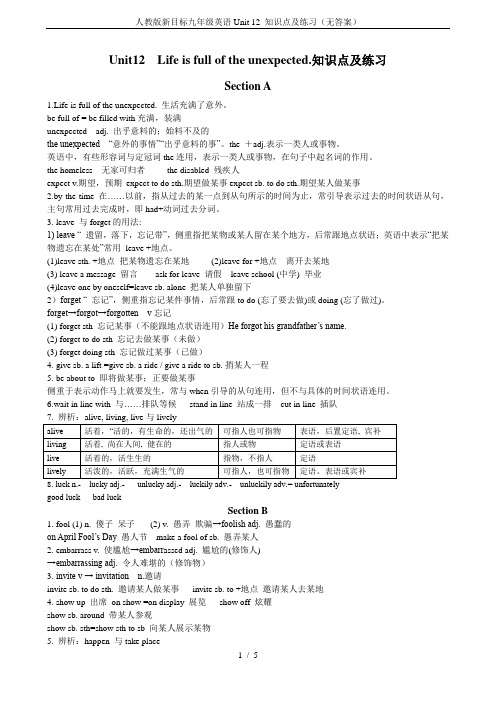
Unit12 Life is full of the unexpected.知识点及练习Section A1.Life is full of the unexpected. 生活充满了意外。
be full of = be filled with充满,装满unexpected adj. 出乎意料的;始料不及的the unexpected “意外的事情”“出乎意料的事”。
the +adj.表示一类人或事物。
英语中,有些形容词与定冠词the连用,表示一类人或事物,在句子中起名词的作用。
the homeless 无家可归者the disabled 残疾人expect v.期望,预期expect to do sth.期望做某事expect sb. to do sth.期望某人做某事2.by the time 在……以前,指从过去的某一点到从句所示的时间为止,常引导表示过去的时间状语从句,主句常用过去完成时,即had+动词过去分词。
3. leave 与forget的用法:1) leave “ 遗留,落下,忘记带”,侧重指把某物或某人留在某个地方,后常跟地点状语;英语中表示“把某物遗忘在某处”常用leave +地点。
(1)leave sth. +地点把某物遗忘在某地(2)leave for +地点离开去某地(3) leave a message 留言ask for leave 请假leave school (中学) 毕业(4)leave one by oneself=leave sb. alone 把某人单独留下2)forget “ 忘记”,侧重指忘记某件事情,后常跟to do (忘了要去做)或doing (忘了做过)。
forget→forgot→forgotten v忘记(1) forget sth 忘记某事(不能跟地点状语连用)He forgot his grandfather’s name.(2) forget to do sth 忘记去做某事(未做)(3) forget doing sth 忘记做过某事(已做)4. give sb. a lift =give sb. a ride / give a ride to sb. 捎某人一程5. be about to 即将做某事;正要做某事侧重于表示动作马上就要发生,常与when引导的从句连用,但不与具体的时间状语连用。
人教版新目标九年级全一册英语 Unit 12 知识点考点复习提纲
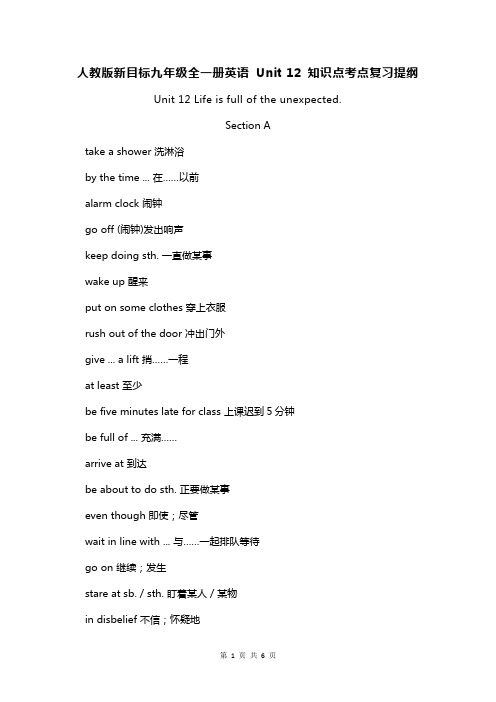
人教版新目标九年级全一册英语Unit 12 知识点考点复习提纲Unit 12 Life is full of the unexpected.Section Atake a shower 洗淋浴by the time ... 在……以前alarm clock 闹钟go off (闹钟)发出响声keep doing sth. 一直做某事wake up 醒来put on some clothes 穿上衣服rush out of the door 冲出门外give ... a lift 捎……一程at least 至少be five minutes late for class 上课迟到5分钟be full of ... 充满……arrive at 到达be about to do sth. 正要做某事even though 即使;尽管wait in line with ... 与……一起排队等待go on 继续;发生stare at sb. / sth. 盯着某人 / 某物in disbelief 不信;怀疑地jump out of bed 从床上跳下来go straight to the airport 直奔机场miss my plane 误了航班think to oneself 心中想;盘算wait till the next day 等到第二天hear about 听说the day before 前一天turn into 变成show up 露面;赶到by the end of 在(某时间点)以前Section B get dressed 穿上衣服costume party 化装舞会stay up all night 整晚熬夜April Fool’s Day 愚人节an introduction to ... 对……的介绍take place 发生local supermarkets 当地的超市sell out 卖光lose weight 减肥find out 弄清;查明end up doing sth. 以做某事告终get married 结婚cancel his show 取消他的节目hundreds of 成百上千的;数以百计的thousands of 成千上万的;数以千计的police officers 警官rush to ... 匆忙去……more than 超过;多于run away from 逃离on the first day of school 在上学第一天turn around 转向;回转hand in 上交【重点句型】1. By the time I got up, my brother had already gotten in the shower. 当我起床时,我哥哥已经进了浴室了。
(word完整版)人教版九年级英语unit12知识点,推荐文档
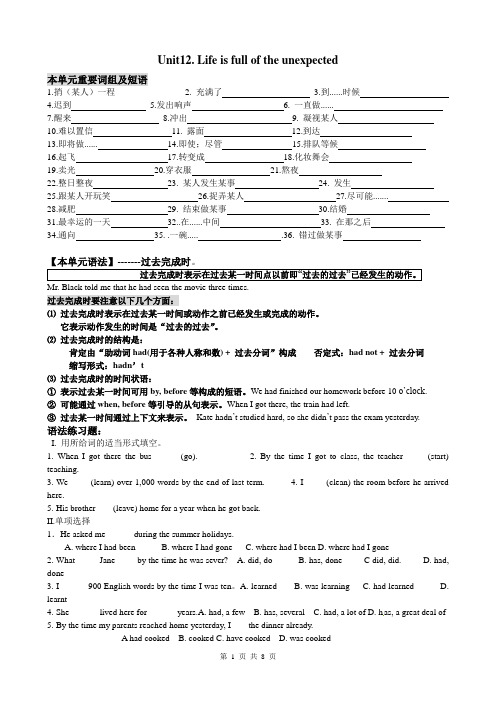
Unit12. Life is full of the unexpected本单元重要词组及短语1.捎(某人)一程____________2. 充满了3.到......时候4.迟到5.发出响声6. 一直做......7.醒来8.冲出9. 凝视某人10.难以置信11. 露面12.到达13.即将做...... 14.即使;尽管15.排队等候16.起飞17.转变成18.化妆舞会19.卖光20.穿衣服21.熬夜22.整日整夜23. 某人发生某事24. 发生25.跟某人开玩笑26.捉弄某人27.尽可能.......28.减肥29. 结束做某事30.结婚31.最幸运的一天32..在......中间33. 在那之后34.通向35. .一碗..... .36. 错过做某事过去完成时表示在过去某一时间点以前即“过去的过去”已经发生的动作。
Mr. Black told me that he had seen the movie three times.过去完成时要注意以下几个方面:⑴过去完成时表示在过去某一时间或动作之前已经发生或完成的动作。
它表示动作发生的时间是“过去的过去”。
⑵过去完成时的结构是:肯定由“助动词had(用于各种人称和数) + 过去分词”构成否定式:had not + 过去分词缩写形式:hadn’t⑶过去完成时的时间状语:①表示过去某一时间可用by, before等构成的短语。
We had finished our homework before 10 o’clock.②可能通过when, before等引导的从句表示。
When I got there, the train had left.③过去某一时间通过上下文来表示。
Kate hadn’t studied hard, so she didn’t pass the exam yesterday.语法练习题:I. 用所给词的适当形式填空。
1. When I got there the bus _____ (go).2. By the time I got to class, the teacher ____ (start) teaching.3. We ____ (learn) over 1,000 words by the end of last term.4. I ____ (clean) the room before he arrived here.5. His brother ___ (leave) home for a year when he got back.II.单项选择1.He asked me __ ___ during the summer holidays.A. where I had beenB. where I had goneC. where had I beenD. where had I gone2. What _ ___ Jane ____ by the time he was sever? A. did, do B. has, done C did, did. D. had, done3. I __ ___ 900 English words by the time I was ten。
- 1、下载文档前请自行甄别文档内容的完整性,平台不提供额外的编辑、内容补充、找答案等附加服务。
- 2、"仅部分预览"的文档,不可在线预览部分如存在完整性等问题,可反馈申请退款(可完整预览的文档不适用该条件!)。
- 3、如文档侵犯您的权益,请联系客服反馈,我们会尽快为您处理(人工客服工作时间:9:00-18:30)。
Unit12 Life is full of the unexpected.知识点及练习Section A1.Life is full of the unexpected. 生活充满了意外。
be full of = be filled with充满,装满unexpected adj. 出乎意料的;始料不及的the unexpected “意外的事情”“出乎意料的事”。
the +adj.表示一类人或事物。
英语中,有些形容词与定冠词the连用,表示一类人或事物,在句子中起名词的作用。
the homeless 无家可归者the disabled 残疾人expect v.期望,预期expect to do sth.期望做某事expect sb. to do sth.期望某人做某事2.by the time 在……以前,指从过去的某一点到从句所示的时间为止,常引导表示过去的时间状语从句,主句常用过去完成时,即had+动词过去分词。
3. leave 与forget的用法:1) leave “ 遗留,落下,忘记带”,侧重指把某物或某人留在某个地方,后常跟地点状语;英语中表示“把某物遗忘在某处”常用leave +地点。
(1)leave sth. +地点把某物遗忘在某地(2)leave for +地点离开去某地(3) leave a message 留言ask for leave 请假leave school (中学) 毕业(4)leave one by oneself=leave sb. alone 把某人单独留下2)forget “ 忘记”,侧重指忘记某件事情,后常跟to do (忘了要去做)或doing (忘了做过)。
forget→forgot→forgotten v忘记(1) forget sth 忘记某事(不能跟地点状语连用)He forgot his grandfather’s name.(2) forget to do sth 忘记去做某事(未做)(3) forget doing sth 忘记做过某事(已做)4. give sb. a lift =give sb. a ride / give a ride to sb. 捎某人一程5. be about to 即将做某事;正要做某事侧重于表示动作马上就要发生,常与when引导的从句连用,但不与具体的时间状语连用。
6.wait in line with 与……排队等候stand in line 站成一排cut in line 插队7. 辨析:alive, living, live与livelyalive活着,“活的,有生命的,还出气的可指人也可指物表语,后置定语, 宾补living活着, 尚在人间, 健在的指人或物定语或表语live活着的,活生生的指物,不指人定语lively活泼的,活跃,充满生气的可指人,也可指物定语、表语或宾补8. luck n.- lucky adj.- unlucky adj.- luckily adv.- unluckily adv.= unfortunatelygood luck bad luckSection B1. fool (1) n. 傻子呆子(2) v. 愚弄欺骗→foolish adj. 愚蠢的on April Fool’s Day 愚人节make a fool of sb. 愚弄某人2. embarrass v. 使尴尬→embarrassed adj. 尴尬的(修饰人)→embarrassing adj. 令人难堪的(修饰物)3. invite v → invitation n.邀请invite sb. to do sth. 邀请某人做某事invite sb. to +地点邀请某人去某地4. show up 出席on show =on display 展览show off 炫耀show sb. around 带某人参观show sb. sth=show sth to sb 向某人展示某物5. 辨析:happen 与take place常指具体的事物的发生,特别指那些偶然的“发生”。
不及物动词,没有被动语happen态sth. happen to sb. 意为“ 某人发生某事”。
后接不定式,表示“碰巧;恰好”之意。
happen to do sth 意为‘‘碰巧做....take place1“发生”, 也无被动语态,指经过安排或计划地发生。
2“举行”The sports meeting will take place in our school6. end up (doing sth.)(以…)结束;最终成为;最后处于end up sth. 表示“结束某事”。
end up with sth. (以……)结束at the end of .....在....的末端in the end=at last=finally by the end of....直到...末端7. marry v.嫁娶(1)A marry B. “A 与B结婚” Bill married Mary on January 1, 1994.(2)A and B get married = A and B are married A和B结婚get married 结婚Kate and Tom get married last year.(3) marry A to B “ 把A 嫁给B” She married her daughter to a rich man.(4) be married to sb. 与……结婚8. How do you feel about…? = What do you think of…?= How do you like…?“你怎样看待……?” 用于提问对方对某事物的观点9. the other, the others, other, others, another 辨析the other 表示特指两个或者两部份中的另一个或另一部分表示两个中的一个......另一个.......时,常用one.....the other.....。
He has two brothers, one is a teacher, the other is a doctor.the others特指某一范围内的其他的(人或物),是the other的复数形式,相当于the other+复数名词。
You two stay here, the others go with me.I’m different from Jeff because I’m louder than the other kids (any other kid) in my class.other 作代词或形容词,可修饰可数名词单数或复数。
We learn Chinese, Maths, English and other subjects.others 作代词,泛指“其他的人或物”。
Some students are doing homework,others are talking loudly.another 泛指同类事物中的三者或三者以上的“另一个”,只能代替或修饰单数可数名词。
I don’t like this one. Please show me another one.其他短语:1. take a shower 洗淋浴2. be late for 迟到3.go off 发出响声, (闹钟)闹响4.wake up 醒来,叫醒fall asleep 睡着,入睡5. rush out 冲出去,冲出……6. at least 至少at most 至多7. decide to do sth. = make a decision to do sth. 决定做某事8. wait in line 排队等候9. in disbelief 不相信,疑惑,怀疑10. take off 起飞;脱下11.turn into 变成12.around the world = all over the world 全世界13. play tricks on sb. 捉弄某人14. play jokes on sb. 对某人开玩笑15. as…as sb. can = as…as possible 尽可能…的16. sell out 卖光17. lose weight 减肥put on weight 增重18. find out 找出,查明,弄清楚19. land on 着陆;降落take off 起飞20. on the earth 在地球上on earth 究竟基础练习题I. 根据句意及首字母提示填写单词。
1.The news was so u__________ that we were all surprised.2.Uncle Black o__________ this morning and was late for work this morning.3.People used to b__________ oil lams to get light.4.The moon was a__________ the trees in the east.5.The stranger s__________ at me and it made me uncomfortable.6.Mr. Wang a__________ that we we'll have a picnic tomorrow.7.The beautiful scene of that mountain village will probably d__________ forever because of pollution.8.The doctors kept on saving the old man t__________ he woke up.9.Perhaps he'll dress himself up as a clown in the c__________ party.10.He was still a__________ after he experienced the terrible earthquake.11.It's reported that lots of people were f__________ by the hoax.12.I'm afraid I'll have to c________ our meeting tomorrow.II.单项选择( ) 1.--Why was Miss Lee angry this morning? --Because Tom didn't _____ his homework.A. hand outB. hand inC. give awayD. give out( ) 2.--Would you like to go for a picnic tomorrow? --Sorry, I have to _____ my homework.A. work onB. put onC. put outD. take away( ) 3.By the time I locked the door, I realized I ____my keys at home.A. had repairedB. had changedC. had forgottenD. had left( ) 4.--We all went to the cinema except you last night. Why didn't you come?--Because I _____that movie twice.A. have watchedB. had watchedC. was watchingD. would watch( )5. Listen! They are talking in low ________. A. voice B. voices C. noise D. sound( )6. The boy________ has been sent to the hospital. A. to burn B. burnt C. is burnt D. was burnt ( )7. The soldier worked hard and tried to prevent the water from________.A. riseB. risingC. raiseD. raising( ) 8.The fish we caught yesterday is still________.A. liveB. to liveC. aliveD. lively( ) 9.--How long have Mr. and Mrs. Smith________? --For more than twenty years.A. marriedB. had marriedC. got marriedD. been married( ) 10.To our great surprise, the old man ended up ________ himself in his house.A. killB. killingC. to killD. to killing( )11. --He looked at his grades ___________ disbelief. He thought he could pass the exam, but he failed.--Maybe he should work harder. A. for B. by C. with D. In( ) 12.His story always _______ very funny.A. end up withB. end up beingC. ends up withD. ends up being( ) 13._______ him and then try to try what he does. A. Mind B. See C. Stare at D. Watch ( ) 14.--Sorry, I stayed up late last night. --_______ you look tired now.A. No needB. No wayC. No wonderD. No doubt( ) 15.--When will we start?--As the road to the airport is under repair, we will have to ______ early to get there in time.A. turn offB. take offC. put offD. set offIII.根据所给词的正确形式填空。
